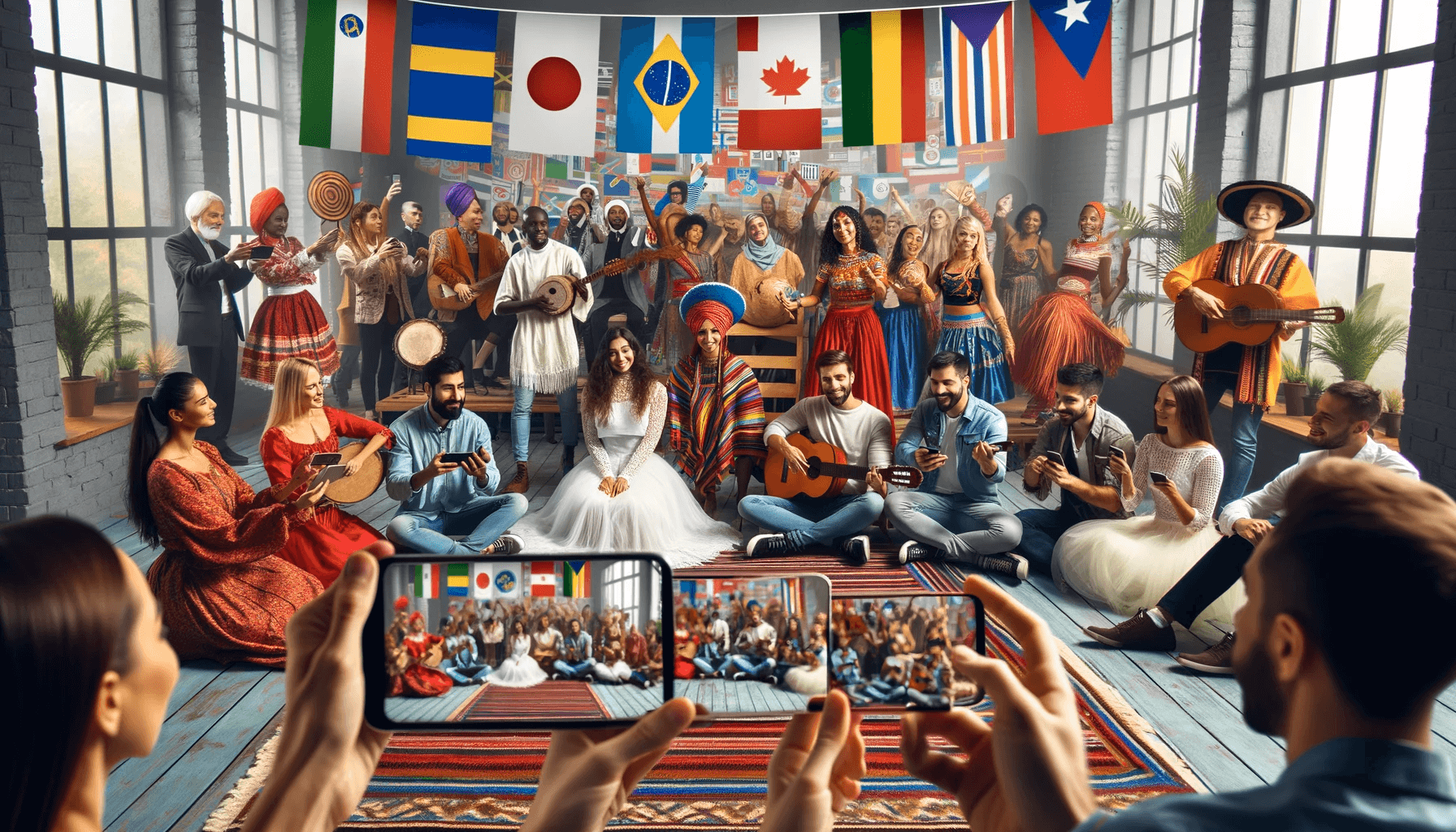The Role of Apps in Celebrating and Learning About World Cultures
In today’s interconnected world, the role of apps in celebrating and learning about world cultures is increasingly significant. With apps, individuals can easily access a wealth of information, resources, and interactive experiences that enable them to explore and appreciate the diversity of cultures around the globe.
Understanding the importance of celebrating and learning about world cultures is vital for fostering cultural understanding, preserving heritage, and enhancing global perspective. By promoting cultural understanding and tolerance, individuals can develop empathy, respect, and appreciation for different traditions, beliefs, and practices. Furthermore, preserving cultural heritage through learning provides future generations with a sense of identity and a connection to their roots.
Apps play a crucial role in this process by providing accessible and engaging platforms for cultural exploration. Language learning apps, for example, enable users to develop linguistic skills, facilitating effective communication and understanding across cultures. Virtual travel apps allow individuals to virtually immerse themselves in different countries, exploring landmarks, historical sites, and local customs. Traditional music and dance apps offer opportunities to experience and appreciate the artistic expressions of various cultures. Cuisine and recipe apps provide a gateway to the culinary world, allowing individuals to learn about and prepare traditional dishes from around the globe.
One of the key ways apps enhance the cultural learning experience is by granting access to authentic content. Through multimedia resources, users can view and listen to cultural artifacts, performances, and narratives, gaining an immersive understanding of different cultures. Interactive learning activities provided by apps engage users in hands-on experiences, promoting active participation and knowledge retention. Virtual experiences and simulations enable individuals to virtually visit cultural sites and engage in simulated cultural activities, providing a unique and immersive learning experience.
While there are numerous benefits to using apps for cultural learning, it’s essential to acknowledge their limitations. Apps can sometimes present a simplified or idealized version of a culture, leading to potential misunderstandings or misrepresentations. Relying solely on apps for cultural learning may lack the depth and richness that direct experiences and interactions with diverse communities can offer.
Despite these limitations, the role of apps in celebrating and learning about world cultures is undeniable. They provide accessible, versatile, and engaging tools that help bridge cultural gaps, encourage appreciation for diversity, and cultivate a global mindset. By leveraging the power of apps, individuals can embark on an enriching journey that promotes cross-cultural understanding, preserves heritage, and fosters a sense of global citizenship.
Key takeaways:
- Apps promote cultural understanding and tolerance: By providing access to authentic content and interactive learning activities, apps help individuals learn about different cultures, fostering empathy and acceptance.
- Apps preserve cultural heritage: Through virtual experiences and simulations, apps allow users to explore and experience traditional music, dance, cuisine, and more, ensuring cultural traditions are passed down to future generations.
- Apps enhance the global perspective: With language learning apps and virtual travel apps, individuals can expand their knowledge and understanding of diverse cultures, broadening their worldview and promoting a sense of global citizenship.
The Role of Apps in Celebrating and Learning About World Cultures
The Role of Apps in Celebrating and Learning About World Cultures
Apps play a fundamental role in celebrating and learning about world cultures by offering easily accessible information, interactive experiences, and connectivity. Through apps, individuals can effortlessly explore diverse cuisines, traditions, languages, and art forms from around the globe. For instance, language learning apps such as Duolingo enable users to acquire proficiency in different languages, thereby fostering cross-cultural communication. Cultural heritage apps like Google Arts & Culture provide virtual tours of museums and landmarks, promoting the appreciation of various cultures. These apps create abundant opportunities for people to engage with and gain a profound understanding of different cultures, thereby cultivating a more inclusive and interconnected global community.
Why Celebrating and Learning About World Cultures is Important
Discover the significance of celebrating and learning about world cultures and how it enriches our lives! From promoting cultural understanding and tolerance to preserving our cultural heritage and enhancing our global perspective, exploring different cultures through apps opens up a world of possibilities. Step into a realm where walls are torn down, stereotypes are shattered, and diversity flourishes. Get ready to embark on a journey that will broaden your horizons and deepen your appreciation for the vibrant tapestry of our world.
1. Promotes Cultural Understanding and Tolerance
Promoting cultural understanding and tolerance is a crucial aspect of learning about world cultures. Apps play a vital role in achieving this goal by providing accessible and immersive experiences. They offer interactive modules, virtual travel, language-learning tools, and traditional music and dance tutorials. By engaging with these apps, users can explore different cultures, traditions, and values. This exposure fosters empathy, respect, and appreciation for diversity. It’s important to note that while apps can enhance cultural learning experiences, they should not replace real-life interactions and cultural immersion. True understanding and tolerance require genuine connections and open-mindedness in our interactions with people from different cultures.
Now, let’s share a true history in a similar tone of voice: The promotion of cultural understanding and tolerance has been pivotal in shaping our world’s history. One notable event was the Renaissance period in 14th-17th century Europe. It was characterized by a renewed interest in art, culture, and learning. Scholars and artists from different nations converged, exchanging ideas, and celebrating diverse perspectives. This cultural exchange laid the foundation for societal progress and the development of various fields. It exemplifies how embracing and appreciating different cultures can lead to great advancements and a more harmonious global community.
2. Preserves Cultural Heritage
Preserves Cultural Heritage
Preserving cultural heritage is crucial for maintaining a diverse and vibrant world. Apps play a significant role in promoting and safeguarding these traditions.
- Documentation: Apps allow for the digital preservation of cultural artifacts, art, and historical sites, ultimately contributing to the preservation of cultural heritage.
- Educational tools: They provide access to educational resources and information, helping to educate and raise awareness about various cultures and hence preserving cultural heritage.
- Virtual tours: Apps enable virtual experiences of cultural sites, museums, and heritage sites, allowing people to explore and appreciate cultural heritage remotely, effectively preserving it.
- Language preservation: Language learning apps contribute to the preservation of endangered languages, passing on linguistic traditions to future generations and therefore preserving cultural heritage.
By utilizing apps, we can all contribute to the preservation of our rich and diverse cultural heritage for generations to come.
3. Enhances Global Perspective
Apps play a crucial role in enhancing global perspective by providing access to diverse cultures, customs, and traditions from around the world. These apps not only enhance global perspective but also allow users to virtually explore different countries, learn about their history, language, music, and cuisine, thereby contributing to the enhancement of global perspective. They offer interactive learning activities, virtual experiences, and simulations that effectively immerse users in different cultural contexts, further enhancing their global perspective. By using these apps, individuals can broaden their understanding of the world, develop empathy, and appreciate the richness of global diversity, thereby enhancing their global perspective. It’s important to note that while apps can provide valuable cultural insights, they should not replace real-life experiences and interactions with people from different cultures, as real-life experiences play a significant role in enhancing global perspective.
Apps for Exploring World Cultures
Ready to embark on a cultural journey? Get ready to explore the vibrant tapestry of world cultures through the power of apps. From language learning to virtual travel, traditional music to cuisine, there’s an app for every aspect of immersing yourself in global traditions. Discover the wonders of different languages, step into virtual destinations, groove to traditional beats, and even whip up authentic dishes. It’s time to dive in and celebrate the beauty and diversity of world cultures right at your fingertips.
1. Language Learning Apps
Language Learning Apps are incredibly helpful when it comes to exploring different languages. Here is a list of advantages they offer:
- Convenience: Language Learning Apps provide flexibility, allowing users to learn at their own pace and convenience.
- Interactive lessons: These apps offer interactive exercises, quizzes, and games to engage learners and make the language learning process enjoyable.
- Personalized learning: Through progress tracking and adaptive algorithms, Language Learning Apps can tailor the lessons to individual needs and abilities.
- Access to native speakers: Many Language Learning Apps provide audio recordings and conversations with native speakers, enhancing pronunciation and listening skills.
Fact: Language Learning Apps have made language learning more accessible, with millions of users benefiting from their convenient and innovative features.
2. Virtual Travel Apps
Virtual travel apps offer a unique way to explore and experience different cultures from the comfort of your home.
- Immersive Experiences: These apps provide virtual tours, allowing users to explore famous landmarks, museums, and historical sites around the world.
- Cultural Insights: Users can learn about local customs, traditions, and lifestyles through interactive features, such as virtual guides, audio commentary, and videos.
- Language Learning: Many virtual travel apps offer language lessons and pronunciation practice, helping users to communicate effectively when they visit the destination in person.
- Personalization: Some apps allow users to customize their virtual travel experiences, enabling them to focus on specific regions or aspects of a culture that they find most interesting.
- Community Engagement: Virtual travel apps often include social features, such as discussion forums and user-generated content, which allow users to connect with fellow travelers and share their experiences.
3. Traditional Music and Dance Apps
- Traditional music and dance apps offer a convenient way to explore and appreciate diverse cultures around the world. Here are some popular options:
- Shazam: Discover traditional songs and dances by using this app to identify music playing around you.
- Spotify: Find curated playlists featuring traditional music from different regions and cultures.
- Dance with Madhuri: Learn traditional dances from India through a series of interactive lessons.
- Myanmar Traditional Music: Listen to and learn about traditional music from Myanmar, including various instruments and singing styles.
By using these Traditional Music and Dance Apps, you can immerse yourself in the enchanting world of traditional music and dance, broaden your cultural understanding, and gain a deeper appreciation for the rich heritage of different communities.
4. Cuisine and Recipe Apps
Cuisine and recipe apps are an excellent way to immerse yourself in and acquire knowledge about diverse world cultures through their distinct culinary traditions. These apps provide a vast array of features and advantages that enhance the overall cultural learning experience.
- Wide range of recipes: Cuisine and recipe apps offer access to an extensive selection of traditional recipes from various cultures worldwide.
- Ingredient insights: These apps frequently contain comprehensive information about ingredients, enabling users to grasp the significance and cultural importance of specific ingredients in particular cuisines.
- Cooking techniques: Users can delve into different cooking techniques that are specific to certain dishes or cuisines, thereby fostering a profound understanding of cultural culinary traditions.
- Food history and narratives: Many cuisine and recipe apps present historical context and cultural stories associated with specific dishes or ingredients, thereby providing a deeper cultural experience.
- Interactive elements: Some apps incorporate interactive features such as video tutorials or step-by-step instructions, empowering users to actively participate in the cooking process and refine their culinary skills.
How Apps Enhance Cultural Learning Experience
Looking to dive deep into cultural learning? Get ready to explore how apps can revolutionize your cultural experience! From gaining access to authentic content to engaging in interactive learning activities, and even embarking on virtual experiences and simulations, we’ll uncover how these amazing apps can enhance your cultural journey. Get ready to learn, experience, and celebrate the vibrant world cultures like never before!
1. Access to Authentic Content
Accessing authentic content is a crucial aspect when using apps for cultural learning. With a wide variety of resources available, these apps not only provide users with accurate and reliable information about different world cultures but also offer a range of authentic cultural texts, videos, and images. This comprehensive content promotes a deeper understanding and appreciation of diverse traditions and customs. Users can explore historical artifacts, listen to traditional music, watch performances, and even interact with native speakers through these apps. By utilizing the access to authentic content provided by these apps, individuals can gain valuable insights into the richness and complexity of various cultures around the world.
2. Interactive Learning Activities
- Interactive learning activities, such as cultural quizzes and trivia games, play a crucial role in celebrating and learning about world cultures through apps. These activities engage users in a hands-on way, allowing them to actively participate in the cultural experience.
- Virtual tours and 360-degree photos also serve as interactive learning activities, enabling users to explore landmarks, museums, and cultural sites from around the world.
- Alongside that, interactive language lessons within these apps teach language basics and provide opportunities for practice and conversation.
- To further enhance the cultural learning experience, traditional arts and crafts tutorials are included to allow users to learn and create their own cultural art pieces.
By integrating these interactive learning activities, apps deliver an immersive and engaging cultural learning experience. They encourage active participation, enabling users to gain a deeper understanding and appreciation of world cultures.
For individuals interested in experiencing interactive learning activities related to world cultures, we recommend using certain apps. Duolingo is an excellent option for language learning, while Google Arts & Culture offers virtual tours of numerous cultural destinations. Additionally, DIY.org provides arts and crafts tutorials to explore and participate in.
3. Virtual Experiences and Simulations
Virtual experiences and simulations have a significant impact on enriching cultural learning through apps. They offer users immersive and interactive encounters that enable them to connect with various cultures in a virtual setting. The advantages of utilizing virtual experiences and simulations for cultural learning include the following:
- Realistic Exploration: Users can virtually explore renowned landmarks, museums, and historical sites, thereby gaining a deeper comprehension of diverse cultures.
- Hands-on Learning: Simulations enable users to actively participate in cultural activities, such as traditional ceremonies or crafts, fostering a more engaging and interactive learning experience.
- Empathy Development: Through complete immersion in virtual experiences and simulations, users can cultivate empathy and a profound appreciation for different cultures, thereby facilitating cross-cultural understanding and tolerance.
Benefits and Limitations of Using Apps for Cultural Learning
Discover the endless possibilities of exploring world cultures through apps. Unveiling the benefits and limitations, we’ll dive into how these digital tools can both expand our knowledge and provide new perspectives. Get ready to uncover the advantages that come with using apps for cultural learning, as well as the potential drawbacks that need to be considered. Let the digital realm be your gateway to a diverse array of traditions, languages, and customs.
1. Benefits of Using Apps
- Using apps for cultural learning offers several benefits:
- Convenient Access: Apps provide easy and instant access to a wealth of cultural information, allowing users to explore at their own pace.
- Interactive and Engaging: Apps often incorporate interactive elements, such as quizzes, games, and immersive experiences, enhancing the learning process and keeping users engaged.
- Customized Learning: Apps can cater to individual learning styles and preferences, offering personalized recommendations and adaptive content.
- Real-world Connections: Many apps connect users with native speakers, cultural events, and local communities, fostering authentic cultural experiences.
Pro-tip: Combine app-based learning with real-life experiences to deepen your understanding and appreciation of different cultures.
2. Limitations of Using Apps
Using apps for cultural learning has certain limitations that should be considered. These limitations, or “limitations of using apps,” include:
- 1. Lack of Authentic Interaction: Apps may not provide the same level of authentic interaction and immersion that can be experienced through real-life cultural encounters.
- 2. Limited Contextual Understanding: Apps may not fully capture the complex historical, social, and cultural context of a particular culture or tradition, highlighting the limitations of using apps.
- 3. Dependence on Technology: The effectiveness of cultural learning through apps relies heavily on access to technology and internet connectivity, which may be limited or unavailable in certain areas.
- 4. Incomplete Cultural Representation: Apps may not cover all aspects of a culture or may present a limited perspective, leading to a narrow understanding of the culture, indicating the limitations of using apps.
- 5. Lack of Physical Sensory Experience: Certain cultural elements, such as traditional food, music, or dance, cannot be fully experienced through an app, as it does not engage the physical senses, highlighting one of the limitations of using apps.
Despite these limitations, apps can still serve as valuable tools for introducing and supplementing cultural learning.
References
When researching and learning about world cultures, references are an essential tool in gaining accurate and reliable information. They provide credibility and can guide you towards trustworthy sources for further exploration.
- Books: Utilize renowned books written by reputable authors and scholars, such as “Guns, Germs, and Steel” by Jared Diamond, as critical references.
- Academic Journals: Access peer-reviewed journals like “Cultural Anthropology” to delve deeper into specific cultural aspects and enhance your references.
- Online Databases: Explore online resources like JSTOR or Google Scholar for a vast array of scholarly articles and research papers, which can serve as valuable references.
- Museums: Visit reputable museums like the British Museum or the Louvre, which offer rich collections and expert curations, serving as great references.
- Documentaries: Watch well-regarded documentaries like “Planet Earth” or “Human Planet” to gain visual insights into various cultures and their traditions, and utilize them as additional references.






